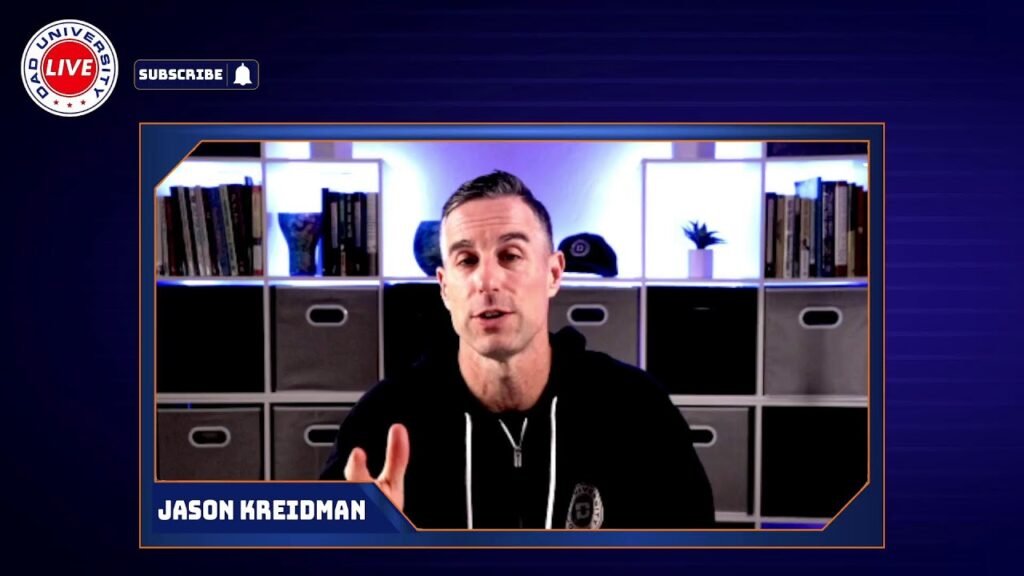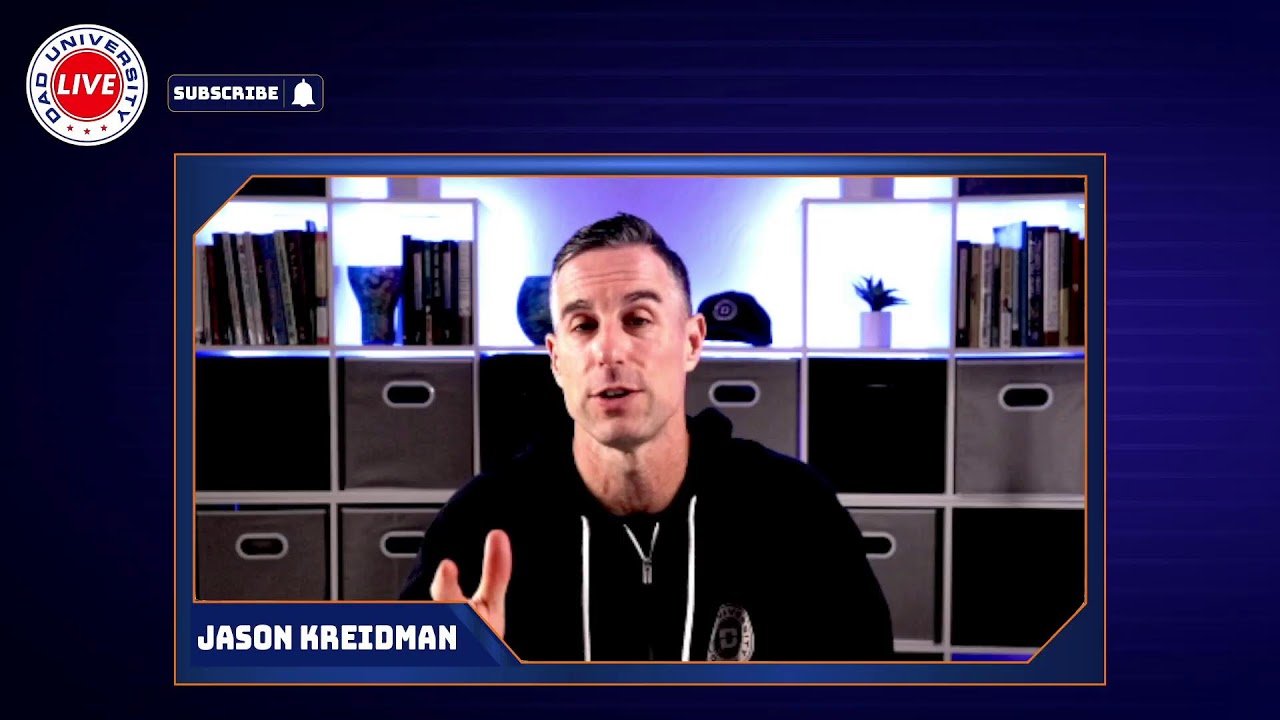Navigating the challenges of parenthood can be quite daunting, especially when dealing with anxiety. That’s why Dad University is here to help! In this live Q&A video, Jason from Dad University invites viewers to ask any questions they may have about parenting, offering his expertise and personal experiences. The video covers a range of topics, from handling tantrums to teaching kids right from wrong, and even delves into the teachings of spiritual teacher Eckhart Tolle. Jason encourages viewer participation through the live chat and discusses the features of the Dad University membership. Don’t miss out on this friendly and informative discussion about the challenges of parenthood and ways to cope with anxiety. Subscribe and support Dad University today!
Navigating the Challenges of Parenthood: Dealing with Anxiety
Parenting is a journey filled with joy, love, and laughter. But it also comes with its fair share of challenges, one of which is anxiety. As a parent, it’s perfectly normal to experience anxiety from time to time. The pressures of raising children, making the right decisions, and ensuring their well-being can be overwhelming. However, when anxiety starts to interfere with your daily life and affects your ability to parent effectively, it’s important to address it head-on. In this article, we will discuss the various aspects of parental anxiety and provide tips and strategies to manage it.

Understanding Anxiety in Parenthood
To effectively deal with parental anxiety, it’s crucial to first understand what anxiety is and its prevalence among parents. Anxiety is a natural response to stress and can range from mild to severe. It manifests as excessive worry, fear, and restlessness. In the context of parenthood, anxiety can stem from various factors, such as worries about your child’s safety, well-being, and future.
Studies have shown that parental anxiety is a common experience, with a significant number of parents reporting symptoms of anxiety. It can affect both mothers and fathers, and its intensity can vary depending on individual circumstances.
Causes and Contributing Factors: The causes of parental anxiety can be multifaceted. Pressure to meet societal expectations, the desire to be a perfect parent, financial stress, and lack of support can all contribute to anxiety in parenthood. Additionally, the rise of social media has also been linked to an increase in parental anxiety, as it often portrays an unrealistic image of parenting.
Impact of Social Media on Parental Anxiety: Social media can be a double-edged sword when it comes to parenting. On one hand, it provides a platform for parents to connect, share experiences, and seek support. On the other hand, it can exacerbate feelings of inadequacy and anxiety. The constant exposure to filtered images of happy families and seemingly perfect parenting can create unrealistic expectations and a sense of failure.
Recognizing the Signs of Anxiety
Recognizing the signs of anxiety is the first step towards managing it effectively. Anxiety can manifest in various ways, and it’s important to pay attention to both physical and emotional symptoms.
Physical Symptoms: Physical signs of anxiety may include rapid heartbeat, sweating, trembling, headaches, stomachaches, and difficulty sleeping or staying asleep. These symptoms can manifest in different ways for different individuals.
Emotional Symptoms: Anxiety can also affect your emotional well-being. Common emotional symptoms include excessive worry, irritability, fear, restlessness, mood swings, and difficulty concentrating or making decisions.
Behavioral Symptoms: Anxiety can influence your behavior and daily functioning. You may find yourself avoiding certain situations or places, becoming easily overwhelmed, experiencing panic attacks, or engaging in compulsive behaviors as a way to cope with anxiety.
Impact on Daily Functioning: When anxiety becomes overwhelming and interferes with your ability to fulfill your parenting responsibilities or engage in daily activities, it’s important to seek support and implement strategies to manage it effectively.
Common Triggers of Parental Anxiety
Understanding the common triggers of parental anxiety can help you identify specific areas that may be contributing to your own anxiety. While these triggers can vary from person to person, there are some common factors that tend to evoke anxiety in parents.
Fear of Failure: The pressure to be a perfect parent and fear of making mistakes can lead to significant anxiety. Parents often question their decisions and worry about the long-term effects of their actions on their children.
Comparison and Parenting Standards: Comparing oneself to other parents, especially on social media, can trigger feelings of inadequacy and self-doubt. Unrealistic expectations and societal pressures to meet certain parenting standards can generate anxiety.
Safety and Well-being of Children: Concerns about the safety and well-being of your children can lead to heightened anxiety. From worrying about accidents, illnesses, and bullying to the challenges of keeping your children safe in today’s world, these concerns can consume a parent’s thoughts.
Financial Pressure: The financial responsibilities of raising children can be a significant source of anxiety for many parents. Providing for their children’s needs and ensuring a stable future can generate stress and worry.
Balancing Work and Family Life: Juggling the demands of work and family life can be a constant challenge, resulting in anxiety. The pressure to excel professionally while also being present and available for your children can create feelings of overwhelm and anxiety.
Effects of Parental Anxiety on Children
Parental anxiety not only affects the parent but can also have a significant impact on children. Children are highly perceptive and can pick up on their parents’ emotional states. When parents are constantly anxious, it can influence their children’s emotional well-being and development.
Emotional Impact on Children: A parent’s anxiety can lead to heightened stress levels in the household, which can affect children’s emotional well-being. They may experience elevated levels of stress, anxiety, and even mimic their parent’s anxious behaviors.
Parent-Child Relationship: When parents are overwhelmed with anxiety, it can strain the parent-child relationship. Anxiety can lead to less emotional availability, increased irritability, and difficulty in providing the calm and supportive environment that children need.
Developmental Consequences: Prolonged exposure to parental anxiety can have a detrimental impact on a child’s social, emotional, and cognitive development. It may affect their ability to regulate their own emotions, develop healthy coping mechanisms, and form secure attachments.
Modeling Behavior and Coping Skills: Parents serve as role models for their children. When children witness their parents engaging in anxious behaviors or struggling to cope with stress, they may internalize those behaviors and adopt similar coping mechanisms.
Tips for Managing Anxiety as a Parent
Managing parental anxiety is crucial for your own well-being and the well-being of your children. While it may not be possible to eliminate anxiety entirely, implementing effective strategies can help you navigate and reduce its impact on your life. Here are some tips for managing anxiety as a parent:
Self-Care and Mindfulness: Prioritize self-care and engage in activities that bring you joy and relaxation. Practice mindfulness techniques, such as deep breathing exercises or meditation, to help calm your mind during times of anxiety.
Seeking Support from Other Parents: Connect with other parents who may be going through similar experiences. Share your worries and seek advice from those who have been there before.
Building a Supportive Network: Surround yourself with a supportive network of friends, family, and professionals who can provide guidance and understanding. Don’t hesitate to seek help when needed.
Healthy Coping Strategies: Develop healthy coping strategies to manage anxiety in healthy ways. This may include engaging in regular exercise, practicing stress-management techniques, and finding hobbies or activities that help you unwind.
Seeking Professional Help: If your anxiety becomes overwhelming and starts to significantly impact your daily life, consider seeking professional help from a therapist or counselor who specializes in anxiety disorders. They can provide tools and strategies tailored to your specific needs.
Seeking Professional Help
While self-help strategies can be effective for managing anxiety, there may be times when professional help is necessary. If your anxiety persists or intensifies despite your efforts to manage it, seeking therapy or counseling can provide significant relief and support.
Exploring Therapy Options: There are various therapy options available to help individuals manage their anxiety. Cognitive-Behavioral Therapy (CBT) is a commonly used approach that focuses on identifying and changing negative thought patterns and behaviors associated with anxiety.
Medication for Anxiety: In some cases, medication may be prescribed to help manage anxiety symptoms. It’s important to consult with a healthcare professional to determine the appropriate medication and dosage for your specific situation.
Alternative and Complementary Therapies: Some individuals find relief from anxiety symptoms through alternative or complementary therapies, such as acupuncture, yoga, or herbal supplements. It’s essential to discuss these options with a healthcare professional before incorporating them into your treatment plan.
Coping Strategies for Parental Anxiety
In addition to seeking professional help, there are several coping strategies that you can incorporate into your daily life to manage parental anxiety effectively. Here are some techniques that you can try:
Breathing Techniques and Relaxation Exercises: Practice deep breathing exercises and relaxation techniques to help calm your mind and ease physical symptoms of anxiety. Taking slow, deep breaths can help reduce feelings of stress and promote a sense of calm.
Journaling and Expressive Writing: Write down your thoughts, worries, and emotions in a journal. Engaging in expressive writing can help provide a sense of release and clarity.
Setting Realistic Expectations: Recognize that there is no such thing as a perfect parent. Set realistic expectations for yourself and your children. Remember that mistakes are a part of the learning process for both you and your child.
Practicing Gratitude: Cultivate a gratitude practice by regularly acknowledging and appreciating the positive aspects of your life. This can help shift your focus from anxiety to the present moment and promote a more positive outlook.
Mindfulness and Meditation: Incorporate mindfulness and meditation into your daily routine. Engaging in mindful activities, such as mindful eating or mindful walking, can help you stay present and reduce anxiety levels.
Supporting a Partner with Parental Anxiety
If your partner is experiencing parental anxiety, providing support and understanding is crucial. Here are some strategies to support a partner with parental anxiety:
Open Communication: Encourage open and honest communication with your partner. Create a safe space where they can express their worries and fears without judgment.
Sharing Parenting Responsibilities: Share the responsibilities of parenting to alleviate some of the pressure your partner may be feeling. Work together as a team to find practical solutions and support each other.
Encouraging Self-Care: Encourage your partner to prioritize self-care and engage in activities that help them relax and recharge. Offer to take over parenting duties while they take a break.
Educating Yourself about Anxiety: Take the time to educate yourself about anxiety and its effects. Understanding the challenges your partner is facing can help you provide better support.
Attending Couples Therapy: Consider couples therapy as a way to navigate parenting anxiety together. A therapist can provide guidance and tools to improve communication, reduce anxiety, and strengthen your relationship.
Conclusion
Parenting is a journey filled with ups and downs, and anxiety is a common challenge that many parents face. By understanding the causes and effects of parental anxiety and implementing effective strategies, you can navigate and overcome your anxiety. Remember, you’re not alone in this journey. Reach out for support, seek professional help if needed, and prioritize self-care. Together, we can create a healthier and happier parenting experience.

